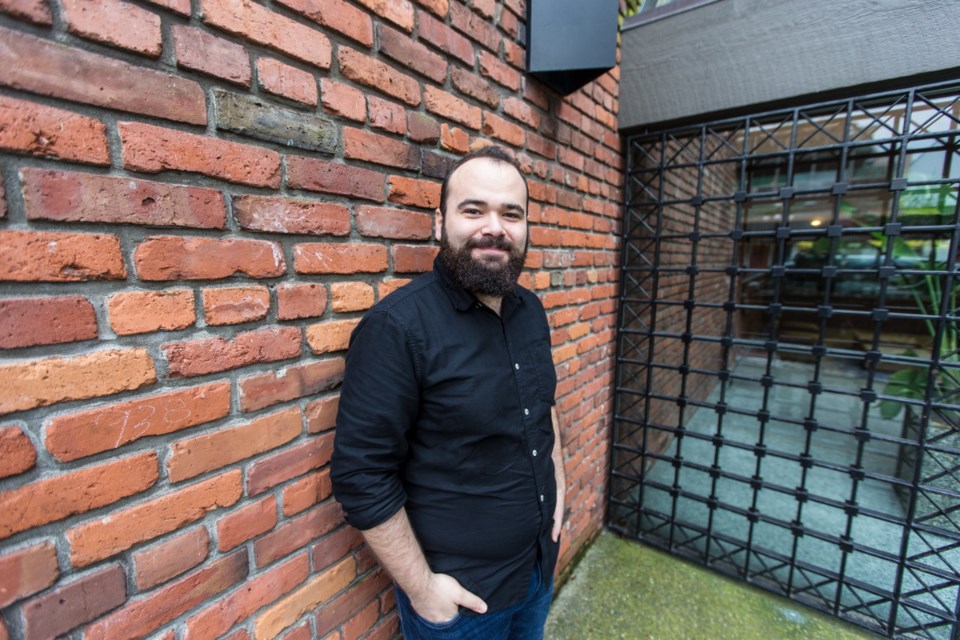 On the eve of Family Day, consider Maz Al-Wafai.
On the eve of Family Day, consider Maz Al-Wafai.
Even before the war in Syria, he didn’t have the dream mom-dad-and-the-kids upbringing. His parents split when he was 2 1/2, and he never fully fit in with either of their families after they remarried.
He’s tight with his two older siblings, a brother and sister, but they haven’t all been together for eight years, since before the war.
So imagine how the 25-year-old feels knowing the three of them will be reunited in Canada soon.
And imagine how it felt, after years of living alone as an unwanted refugee, to be embraced by a brand-new, instant family of two dozen strangers when he got off the plane in Victoria in June. It wasn’t just his cousin(ish) Julie Angus (more about her later) who met him at the airport, but the entire Fairfield group sponsoring him here.
“That was a shock, honestly,” he says. A good shock. “I have a very big family right now.”
“I just feel so lucky that I’m surrounded by loving people. This is coming from someone who for a long time was longing for family. I feel … pampered.”
He says this while perched on a stool in a Fort Street coffee shop, just down from the office building where he hot-desks as a software developer. It’s a long, long way from Homs, where he was raised, where the Syrian revolution began, and where 80 per cent of the city lies in ruins.
Al-Wafai was in Lebanon on a student visa, studying computer sciences at university, when the war broke out in 2011. He crossed back into Syria periodically until forces loyal to the Assad regime arrested him at the border. “My name was on a list.”
He was freed following interrogation, but was stuck in Lebanon after that — a problem when his student visa ran out in 2015. He couldn’t go home to Syria and no other country would take him.
Al-Wafai was effectively stateless, with no path to a stable life. He wasn’t supposed to be in Lebanon, couldn’t even open a bank account or work legally. Finding work wasn’t a problem, as his computer skills were in demand, but he still had to keep his head down: He was fluent in English, the language of the tech sector, but when speaking Arabic he would sometimes try to fake a Lebanese accent to avoid detection.
Meanwhile, his brother, a computer engineer, was similarly stranded in Turkey, while his sister, a chemist, was back in Syria where she had to stay while going through a divorce. “They were in Homs, in the middle of the fighting,” Al-Wafai said of his sister and her two children. “They lived through the bombings, the airstrikes, all the things that were happening in the city.”
The ray of hope was in Victoria, where Julie and Colin Angus live.
The Anguses are well known as real-life Indiana Joneses whose many adventures, including one in which they spent five months rowing across the Atlantic in a 24-foot boat, have been documented in book and film.
In 2008 they spent seven months cycling and rowing from Colin’s ancestral home in Scotland to Syria, where Julie’s father was born. That was followed in 2011 by a Mediterranean sailing trip that was supposed to end in Syria but was interrupted by the war.
Three years ago they made the news for another reason. They were the nucleus around which a disparate group of Fairfield residents formed to bring Julie’s uncle and his family to Victoria as refugees, which they did in 2016. (They’re in Toronto now.)
At the same time, the group began the process of sponsoring Al-Wafai and his siblings, family friends of Julie’s Syrian relatives. (Or maybe they’re cousins. Al-Wafai says family is defined a bit differently in Syria. If your surname is relatively rare, as his is, anyone with the same name is treated as kin.)
Al-Wafai was the first to arrive. He quickly established himself, showed an entrepreneurial flare. He’s about to mentor students learning to code at Victoria’s Lighthouse Labs, is working with a Victoria physician on an app for the health-care sector, and is designing an app for clients in Saudi Arabia. He developed an online learning tool for a New York-based non-profit that links people who want to learn Arabic with teachers who are Syrian refugees.
Now, it’s a matter of waiting for the rest of his family — sometime this year, is the best time estimate. His 31-year-old sister and her kids made it to Turkey a couple of months ago. His 29-year-old brother is working for a humanitarian organization there while awaiting the call to Canada.
Al-Wafai eagerly awaits their reunion. They’re family — but so, too, are his sponsors. That was driven home in August when he crashed his bicycle and they all flocked to his side in hospital. “Their emotional support, just the fact that you can lean on someone, that someone has your back, is something I haven’t felt in awhile,” Al-Wafai says. “It means a lot.”
Think about that when you think about Family Day, and about what real families look like.
For the most part, they don’t look like a Hallmark card. Four in 10 marriages end in divorce. Barely one-quarter of Canadian households are made up of the traditional two-parents-plus-kids model.
There are other definitions, though. “Family is not only blood,” Al-Wafai says. You can end up bonded to people whether they share your DNA or not. How wonderful, after years alone, to care and be cared for in return.
“People who were not so long ago strangers are now so important to me.”



